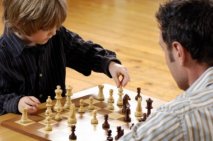Decision Making Approaches - Which Approach Characterizes Your Individual Decision Making?
 The majority of the decisions we make, we make as individuals. In the quest for making more effective decisions, it is appropriate to look at the approaches we pursue in our individual decision making.
The majority of the decisions we make, we make as individuals. In the quest for making more effective decisions, it is appropriate to look at the approaches we pursue in our individual decision making.
Since decision outcomes are not certain, to improve decision quality, it is important to focus on how a decision is made. By looking at decision making approaches we hope to expose some opportunities for improvement that can be achieved regardless of a specific decision approach.
Three decision making approaches to consider
 There are a number of ways to characterize approaches to making decisions, but for our purposes we will consider three large groupings. In most cases, we all tend to make decisions using all of the approaches at one time or another. Think about which approach would best characterize how you make most of your decisions, or would prefer to make your decisions.
There are a number of ways to characterize approaches to making decisions, but for our purposes we will consider three large groupings. In most cases, we all tend to make decisions using all of the approaches at one time or another. Think about which approach would best characterize how you make most of your decisions, or would prefer to make your decisions.
- Rational or Analytical approach - Exemplified by step by step decision making, this approach defines success factors upfront, seeks information and logically looks at how each alternative meets each success factor. Decision making is planned, and choices are made under the premise desired solutions can be achieved except for large unforeseeable or unknowable events. With this approach, consequences of the final choice are taken into consideration.
- Intuitive Decision Making Approach - Relying on emotions and feelings characterizes this approach. Careful planning is not possible or not desired. People will point to a "gut feeling" or "hunch" as the cause for a choice, reflecting that explanation is not accessible through conscious thought.
 Random, Chance, or Luck Approach - In this approach a decision is made on impulse, without thought. Flipping a coin or using a "decision wheel" would be representative of employing this approach. It is sometimes considered a dependent style because this approach can promote denial of responsibility.
Random, Chance, or Luck Approach - In this approach a decision is made on impulse, without thought. Flipping a coin or using a "decision wheel" would be representative of employing this approach. It is sometimes considered a dependent style because this approach can promote denial of responsibility.
Are decision making approaches a consequence of personality?
Personality can characterize some of our emotional and thinking processes, so it is natural to expect that our preferred decision making approach is a function of our personality. Interpretive reports that come from a Myers-Briggs Type Indicator instrument will often have a section that relates your personality facets to your decision making style.
Within Myers-Briggs, the personality facets of sensing vs. intuition, and thinking vs. feeling correlate to elements of the decision making approaches, but they should not be considered causal. There is considerable evidence that our personality changes and evolves over time. This might even suggest personality changes result from our approach to making decisions that lead to changes in our thinking processes.
Some improvement tips focused on your decision making approach
If you use or prefer a rational or analytic approach, consider the following possible improvements.
- Have a decision making process ready that you know works. This allows you to move right into working on a decision without having to delay to determine the steps you will use.
- Gain knowledge of decision traps and biases so they can be avoided when making a decision.
- Learn about alternative decision making techniques that may best be applied for specific decision problems.
- Develop some brainstorming techniques to create or identify alternative solutions for decisions where you have too few options (we recommend 5-7 options for important decisions).
For those that prefer an intuitive decision making approach, some enhancements that may help include the following.
- Ask or consider broad questions about a decision well in advance. This enables the unconscious mind to work in the background to offer up insights and solutions for a choice.
- Learn where your intuition works and where it doesn't. Intuition works best in areas where we have a lot of experience.
- Increase reflection. This makes intuition more reliable because events are processed and added to the subconscious with thought that helps categorize the experience with better accuracy.
 Play games that require making decisions. Games that simulate life choices provide a low risk environment to develop the patterns that can improve intuition.
Play games that require making decisions. Games that simulate life choices provide a low risk environment to develop the patterns that can improve intuition.
If you rely on chance in making choices, here are some improvement ideas.
- Increase attention and recognition. For this approach, outcomes result from random events. Ability to recognize positive opportunities when they occur increases the likelihood of positive results.
- Add knowledge. It will increase the foundation for recognition of good versus poor opportunities.
- Learn about risk and uncertainty. Making choices where the odds are in your favor is great way to increase positive outcomes.
An improvement idea for all individual decision making approaches - form a decision making group
In researching this topic I discovered this interesting report, "Are Two Heads Better than One: An Experimental Analysis of Individual versus Group Decisionmaking", by Princeton professors Alan S. Blinder and John Morgan. The report is 53 pages, so I will just leave you with some of the significant conclusions.
- "Do groups reach decisions more slowly than individuals? According to these experimental results, what seemingly everyone believes (including the authors, prior to this study) is simply not true: Groups appear to be no slower in reaching decisions than individuals are."
- "Do groups make better decisions than individuals? The experimental answer seems to be yes. And the margin of superiority of group over individual decisions is astonishingly similar in the two experiments - about 3.5%."
- "If groups make better decisions and require no more information to do so, then two heads-or, in this case, five-are indeed better than one."
There are some obvious limitations with respect to broad application of these conclusions, particularly with respect to the type of decision being made. However, it does suggest that an obvious possible improvement to all our individual decision making approaches: consider adding one or more people to the decision making process. It may be the easiest way to improve our decision making, particularly for decisions that have significant consequences.
Return from Decision Making Approaches to Decision Making Articles

